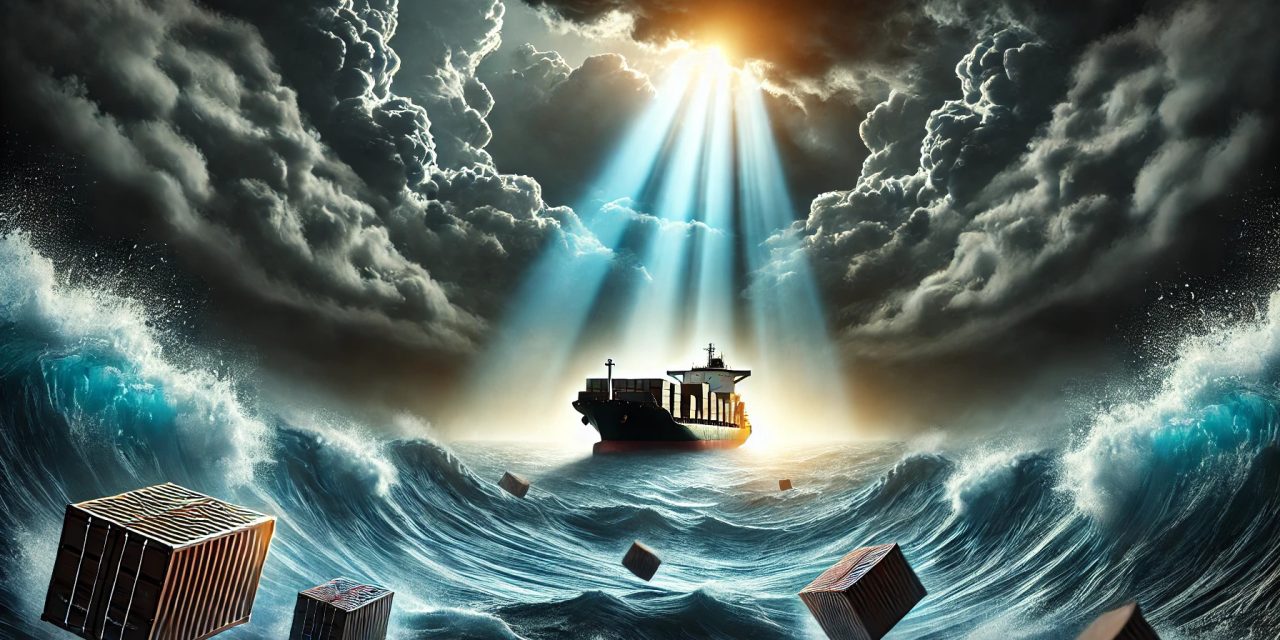Jettison Hindering Cargo
By Dr. Jack R. Hodges, Jr.
Burke County
A new year has come. And with it, comes the hopes of everyone that this will be a prosperous and blessed year. But for that to occur, perhaps there are some lingering things or emotional or physical strongholds that need to be jettisoned. We usually make “New Year’s resolutions.” But as we all realize, those best intentions usually do not last very long. The reasons are varied. But one thing we do know is if God’s people are going to obediently follow Jesus and live for His honor and glory, something usually has to give!
Last year, I had the privilege of preaching a series that is based on the Apostle Paul’s final Mediterranean Sea journey to Rome. One of the sermons had to do with this very topic; that is, the need to let go of earthly things that hold us back from serving the Lord. Luke chronicled that journey in Acts 27-28. The setting is that Paul was sent as a prisoner of Imperial Rome from Caesarea in Israel to Rome to stand trial before the higher courts. While on trial in Caesarea, Paul had appealed to Caesar. His appeal was granted and he was sent under Roman guard to Rome. After a while, Paul set sail as a prisoner aboard a cargo ship. And yet, during this long, difficult voyage, he would continue to find God’s promises, guidance, and provisions along each challenge of the journey.
Cargo ships are specifically built to transport cargo, goods, and materials from one port to another. They usually carry their valuable cargo in the recesses or the “hold” of the ship. But oftentimes that spills over onto the deck of the ship. Merchants pile or cram as much cargo as they can onto the ship without threatening to sink the ship from all the weight. The Alexandrian cargo ship that carries Paul and the others is packed full of precious cargo to be sold for a great price. There is, of course, only a little space left for any travelers—and that space is cramped and uncomfortable.
In Acts 27, we read that Paul and the other prisoners had begun the long, hard journey in Caesarea, and traveled northward aboard an Andramyttian cargo ship. They made a quick stop in Sidon, and then changed ships in Myra. The Alexandrian ship slowly made its way to Fair Havens in Crete. There, the Roman centurion, the captain, and the ship owner ignored Paul’s divine-given wisdom, and the cargo ship, filled to the brim with precious goods, risked traveling into the threat of stormy seas. They hoped to reach the favorable port city of Phoenix on the western side of Crete. But just after they departed Fair Havens, the strong “euroquillo” winds began to beat the seas into a howling tempest. And this would go on for days on end. Imagine the fear and the panic that is suddenly going through the passengers and crew—that is, all except one of them, Paul.
Luke captured the moment in verse 15, “and when the ship was caught in it and could not face the wind, we gave way to it and let ourselves be driven along.” Now, they were at the mercy of the stormy seas. And the experienced captain knew what that meant, they were in real danger of losing not only the ship and all of its precious cargo but all lives as well. Tossed about, the ship was barely under their control. They used every seaworthy skill and technique to stay afloat. Fearing they would run aground (that would mean that the constant battering of waves would soon tear the ship apart and it would certainly be lost), they stopped trying to steer and just let the ship be driven along. The next day, while the storm continued to rage, there was only one thing left to do short of abandoning the ship—they began to toss or jettison the cargo.
It was the only thing left to do in order to keep the ship upright. They must toss everything into the sea. Lightening the load might give them a chance to ride out the storm. And so, that’s what they did! Although considered valuable, at this desperate point, there was no use holding onto any of the cargo. Their lives were at stake!
If your lives, your time, and your minds have become filled with more and more stuff, all very valuable and useful, but you find yourself tossed helplessly in the storms of life, then what are you to do? The answer begins with another question: Are you really serious about living for Christ and becoming a disciple who makes more disciples? If so, then you are going to have to jettison hindering cargo! Some of what we tend to hold onto is good, but not all of it! So, when your life gets so cluttered that even the good stuff gets lost, what do you do? As usual, the Word of God has an answer to that question.
First of all, the Word of God invites you to commit yourself right now to allowing the Holy Spirit to search your heart and mind and see if there is anything that needs to be jettisoned. The Psalmist did that very thing. He writes in Psalm 139:23-24, “Search me, O God, and know my heart; Try me and know my anxious thoughts. And see if there be any hurtful way in me, And lead me in the everlasting way.” And in Psalm 26:2 he called out to the Lord, “Examine me, O Lord, and try me; Test my mind and my heart.” Examine me, Lord. Shine your spotlight of truth on me and expose my heart and mind. Show me any cargo or goods that are weighing me down and turn my eyes toward You.
Secondly, commit yourself to the cleansing work of the Holy Spirit. There are several verses in 1 Thessalonians 5:16-22 that provide us with an ongoing map. Paul urged the believers, “Rejoice always; pray without ceasing; in everything give thanks; for this is God’s will for you in Christ Jesus. Do not quench the Spirit; do not despise prophetic utterances. But examine everything carefully; hold fast to that which is good; abstain from every form of evil.” It was the very same man who faced that life-threatening crisis in the middle of the Mediterranean Sea who wrote this passage. Look at the last verse. Three little imperatives should guide us to discern what cargo to throw overboard:
- Test or examine everything!—The ancients used that expression to refer to testing gold or other precious metals. Knowing the difference between fool’s gold and the real thing matters. It’s a matter of life and death! Discerning between spiritual truth and counterfeit religion or false truths can either sink or keep you afloat.
- Hold onto that which is good!—Some things are worth keeping; but not everything. Knowing the difference is what counts. That’s why Paul prayed (Philippians 1:9-10), “And this is my prayer: that your love may abound more and more in knowledge and in depth of insight, so that you may be able to discern what is best and may be pure and blameless until the day of Christ, filled with the fruit of righteousness that comes through Jesus Christ—to the glory and praise of God.”
- Thirdly, jettison any hindering cargo!—Get rid of all that prevents you from following the plans and purposes of God.
I pray that as you and I face 2025, we will take heed to the lesson of jettisoning hindering cargo, and our hearts, souls, and lives will be focused on making Jesus know and living for Him.
On a side note, I have scheduled a September 2025 “In the Footsteps of the Apostle Paul” trip. It is a 12-day tour departing from Charlotte, which follows the footsteps of Paul through Greece and includes a 4-day Greek Islands cruise with stops at Mykonos Kusadasi (Ephesus in Turkey), Patmos, Rhodes, Crete, and Santorini. Greek sights include: Athens, Corinth, the Corinth Canal, Kalambaka, Berea, Thessolonika, and Philippi. If you are interested in the trip, email me (jackhodges@pleasanthillbc.church) and I will send you a brochure and details.
_________________________________________
Dr. Jack Hodges is the Senior Pastor at Pleasant Hill Baptist Church in Morganton, NC. He has served as a pastor, a biblical counselor, and an International Mission Board missionary.
Read more from Dr. Hodges here.
_________________________________________







